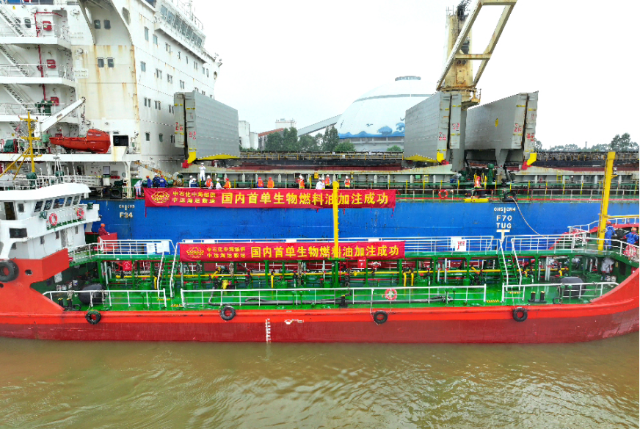Recently, Guangzhou issued a pilot working plan and management specifications on facilitating the use of biofuel for international navigation vessels.
Biofuel is a blend of traditional low-sulphur fuel oil (LSFO) and biodiesel. When burned, the CO2 emissions of biodiesel are 90% less than those of traditional petroleum diesel, and particulate matter (PM) produced decreases by 50%, without any harmful substances such as sulfide.
The raw material for biodiesel is also easy to acquire. Currently, its main source is recycled cooking oil, making its production an efficient way to turn waste into new energy. Besides, there is no need to upgrade the current storage, logistics, and vessel equipment, as relevant operations are simple and safe.
The cost-effective and green new energy has attracted Guangzhou's focus for some time. In April 2024, Guangzhou was approved to join the first batch of biodiesel application piloting. Two months later, an international navigation vessel was injected with high-sulphur biofuel in Guangzhou as the first pioneer in China, adding to the categories of fuel oil types for vessels in the nation. In recent years, the demand for biofuel has been increasing year by year in the South China region.

Under these circumstances, the pilot working plan released this time specifies the main piloting tasks, the implementation procedure, and relevant supporting measures. Biofuel standards, the mixing of biodiesel and fuel oil, biofuel storage and logistics, and management specifications are all included. For the raw material, kitchen oil waste, relevant regulations concerning waste kitchen oil logistics and processing are also included in the plan. The plan is set to facilitate biofuel-related projects to progress smoothly and help the piloting of biofuel to operate in a standardized way.
To support the facilitation of the application of biofuel, Guangzhou has established a joint working mechanism between municipal and local governments to guide investigations on biofuel resources in the city and its adjacent areas, as well as to conduct supporting experiments such as the blending of biodiesel and low-sulphur fuel oil at different ratios.
Next, Guangzhou is committed to more policy innovation and practice to explore a 'Guangzhou mode' of blending biodiesel and fuel oil for the use of vessels. The city also aims to better meet the green and clean energy demand of international navigation vessels by exploring the construction of a clean energy supply chain, consisting of methanol, green ammonia, and more. Together with more optimized injection facilities and supporting industries, Guangzhou is set to upgrade its international shipping capabilities as an international hub.

